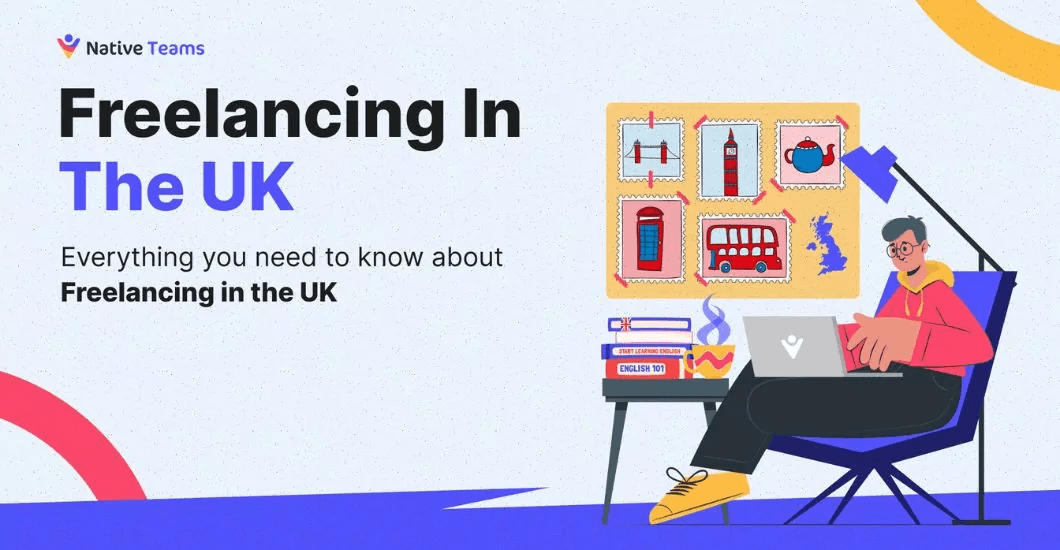Freelancing in the UK: How to Go Freelance in 2025?
The benefits of working on your own terms have always been an attractive feature of freelancing. While this working style is not for everyone, it is ideal for someone who wants to be in charge of their work, is organised, and appreciates the flexibility to work anywhere, whenever, and whatever they choose.
Furthermore, this may be the best option if you want to work on multiple projects with different customers and have the freedom to work wherever you choose. It’s estimated that there are approximately 4 million freelancers in the UK, including graphic designers, social media managers, writers, developers and more.
Being an independent worker has numerous advantages, but it may also provide many challenges. In this article, we’ll look at some of the challenges and problems that UK freelancers now face as well as possible solutions.

Why are people becoming freelancers in the UK?
There are several reasons why persons in the United Kingdom may opt to work as freelancers. Some people may choose freelancing to get more control over their work schedule and the sorts of assignments they work on.
Others may prefer the independence and flexibility that freelancing provides, or they may be drawn to the opportunity for better earnings that freelancing might provide. Some people may become freelancers because they have a certain talent or knowledge that they can offer to clients. Furthermore, some people may become freelancers because they cannot find full-time employment or because they wish to establish their own business.
The amount of people operating as freelancers in the UK is continuously increasing. According to IPSE (The Association for Independent Professionals and the Self-Employed) research, the number of freelancers in the United Kingdom has increased by 43% between 2008 and 2016. There are currently at least 2 million freelance employees, accounting for 42% of the 4.8 million self-employed people, which results in 6% of the UK workforce, and £119 billion in contributions to the UK economy.
While the data include all major industrial categories, the main freelancing occupational groups are:
- Jobs in the arts, literature, and media
- Managers and owners of other businesses
- Professions in teaching and education
- IT and telecommunications jobs
How to become a freelancer in the UK?
Starting a freelance career in the UK might be a fantastic way to increase your freedom and control over your work, but it also requires you to accept more responsibility for your own finances and other personal matters. To get started, consider the following advice:
- Identify your area of expertise: It’s essential to understand exactly what services you can provide as a freelancer. This could be based on your previous employment, education, or hobbies and interests. Do you have IT skills, are you learning German, or maybe you hold a yoga certificate? Think about where you can add value. Reflect on where your skills can make the greatest impact.
- Create a portfolio: Having a portfolio of your prior work will help you attract new clients. This can be a website, a physical portfolio, or even a social media account where you showcase your work.
- Network and advertise yourself: Many freelancers get new clients through word-of-mouth and referrals. Network with other experts in your industry and think about selling yourself using social media, online job boards, or local networking events.
- Set your rates: Determine your service fee based on considerations such as your experience, the difficulty of the work, and the local market rate.
- Create a business plan: Creating a business plan can help you stay organised and focused, and it can also help you acquire financing or investment.
- Register as self-employed: If you are self-employed in the United Kingdom, you must register with HM Revenue and Customs (HMRC). This can be done online or over the phone.
- Consider insurance: As a freelancer, you are responsible for obtaining your own insurance. Liability insurance to safeguard against legal claims, as well as health and income protection insurance, could be included.

Where can I find freelance opportunities in the UK?
There are many places where you can find freelance opportunities in the UK, including:
- Freelance job boards: There are multiple websites that connect freelancers with potential clients. PeoplePerHour, Upwork, and Freelancer.com are some of the most popular freelance job sites in the UK.
- Professional networks and associations: Joining a professional network or organisation in your industry can help you discover freelance work. Many of these groups offer job boards or discussion boards where members can post and find freelance jobs.
- Social media: Many organisations and people use social media sites such as LinkedIn, Twitter, and Facebook to market freelance opportunities. It can be beneficial to check these sites on a frequent basis and to follow relevant hashtags to stay up to speed on potential gigs.
- Your personal network: Your personal and professional network might be a great source of freelance work. Inform people in your network that you are available for freelancing work and ask for referrals or introductions to possible clients.
- Direct contact: If you have a certain organisation or individual in mind for which you would like to work, you can try contacting them directly to see if they have any freelancing jobs available. This can be an excellent approach to getting your foot in the door and establish relationships with potential clients.
How to register to work legally as a freelancer in the UK?
To work legally as a freelancer in the UK, you will need to register as self-employed with HM Revenue & Customs (HMRC). To do this, you will need to:
- Go to the HMRC website and create an account.
- Complete the online registration form, providing information about yourself and your business.
- Wait for HMRC to send you a letter confirming your self-employed status and a Unique Taxpayer Reference (UTR).
- Once you have your UTR, you will need to keep records of your income and expenses and file a self-assessment tax return each year.
Types of business structures for freelancers in the UK
In the UK, there are several types of business structures that freelancers can choose from. The most common types of business structures for freelancers in the UK are:
- Sole trader: This is the simplest business structure for freelancers. As a sole trader, you are the business’s owner and operator, and you are personally liable for all of its debts and responsibilities.
- A partnership is a business form in which two or more people work together to run a business. Partnerships can be general, in which all partners are personally liable for the debts and liabilities of the business, or restricted, in which one or more partners have limited liability.
- A limited company is a legal entity separate from its owners, who are known as shareholders. As a shareholder, your accountability for the company’s debts and responsibilities is limited. Private and public limited firms are both types of limited companies.
- Limited liability partnership (LLP): An LLP is a hybrid business form that incorporates aspects of both partnerships and limited companies. An LLP, like a partnership, is owned by two or more individuals who are individually liable for the business’s debts and responsibilities. An LLP, like a limited corporation, provides its owners with limited liability protection.
It is essential to choose the business structure that best meets your goals and conditions. Consider the nature of your firm, the level of risk involved, and your own personal financial status. Seeking guidance from an expert, such as an accountant or lawyer, can help you determine the ideal business structure for your company.

What taxes do you pay as a freelancer?
As a freelancer in the UK, you will be responsible for paying a range of taxes, including:
- Income tax: This is a tax on all of your earnings, including freelance income. You must pay income tax on any earnings above the personal allowance, which is now £12,570 per year for the fiscal year 2021/22.
- National Insurance Contributions (NICs): If you are self-employed and make more than £6,475 per year, you must pay NICs. You may be required to pay two types of NICs: Class 2 NICs, which are a predetermined weekly sum, and Class 4 NICs, which are a percentage of your revenues.
- Value-added tax (VAT): If your firm is VAT-registered and your taxable turnover exceeds £85,000 per year, you may be required to register for VAT. VAT is a sales tax on goods and services that is often added to the price of your items or services.
In addition to these taxes, depending on the nature of your business and where you are located, you may be required to pay additional fees or penalties. For example, if you operate from a commercial location, you may be required to pay business rates, or you may be required to pay for licences or licences to operate your business.
It’s essential to remember that as a freelancer, you must pay your own taxes and National Insurance obligations. If you have any doubts or worries about your tax obligations, it’s a good idea to keep track of your income and expenses and to seek the assistance of a competent accountant or tax expert.
How can Native Teams help you with a freelancing career in the UK?
Understanding the difficulty of being paid on time, filing taxes, and remaining legally employed, Native Teams developed a platform that allows you to perform all of these tasks from one platform.
The most obvious issue facing freelancers is the administrative procedures attached. These procedures can be time consuming and can ultimately interrupt your workflow and productivity. Outsourcing various procedures can cost money, be difficult to track, and can lack transparency.
If you’re working as a freelancer or working remotely for a company abroad, you can get an official employment status in the UK. Native Teams can act as your employer of record, which means that you will receive all your payments or salaries through our EOR Services and have your taxes and social costs paid.
Native Teams is a global platform that is reshaping the traditional way of working.
We are on a mission to help Freelancers and Remote Workers manage payments and regulate their employment status.
We understand the struggle of receiving regular payments, getting the employment status sorted or handling your taxes. That’s why we created a platform that gives our users more freedom and flexibility to do their work from anywhere in the world whilst staying fully compliant.
We’re currently active in 40+ different countries, but we’re also expanding fast and adding new destinations to the list as we go!

How to invoice as a freelancer in the UK?
If you want a hassle-free solution that is completely free of paperwork and bureaucracy, Native Teams has a fully integrated client invoicing system that provides you with the tools you need to invoice any customer. Multiple payment alternatives are available to make payments as simple as possible.
Invoicing as a freelancer in the UK generally involves the following steps:
- Decide on your payment terms: Make sure to mention your payment terms to your clients in advance. This can include the payment method you accept (for example, bank transfer or credit card), the currency you like to be paid in, and the time frame you expect to be paid in (e.g. 30 days after the invoice date).
- Create an invoice: Your company’s name, contact information, and the client’s name and contact information should all be included on the invoice. It should also include a thorough breakdown of the services or items you delivered, as well as the price and any related taxes.
- Send the invoice: You can send your invoice via email or regular mail, or you can use invoicing software to make and send invoices electronically.
- Follow up on outstanding invoices: If you haven’t received payment within the agreed-upon time limit, you should contact your client to remind them of their payment duty. You can accomplish this by sending a nice reminder email or calling them. You may need to take additional official actions to recover the outstanding money, such as employing a debt collection agency or filing legal action, if necessary.
It is critical to keep detailed records of all invoices sent and money received in order to keep track of your income and expenses for tax purposes. You may also want to think about implementing an invoicing software to help streamline the invoicing process and make financial management easier.
To Summarize
You can develop a successful freelancing job in the UK by following these steps and being proactive in seeking out new possibilities.
Freelancing can be a successful and fulfilling career path, but it requires discipline, planning, and the ability to manage your own time and workload. Before deciding to work as a freelancer in the UK, it is critical to carefully analyse the advantages and downsides of freelancing.
FAQs
Can foreigners freelance in the UK?
Yes, but only if their visa allows work or self-employment. Many visas restrict freelancing, so check your visa terms carefully before starting freelance work.
What is the easiest UK visa to get?
The Visitor visa is easier but doesn’t allow work. For freelancing, the Skilled Worker or Global Talent visas are options, but they require meeting specific criteria.
Can you move to London as a freelancer?
You can only move to London as a freelancer if your visa permits self-employment. There’s no freelance-specific visa, so you must qualify under existing visa rules.
Is freelancing legal in the UK?
Yes, freelancing is legal if you follow UK tax laws and visa rules. Register as self-employed with HMRC and pay taxes on your earnings.
